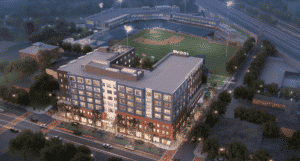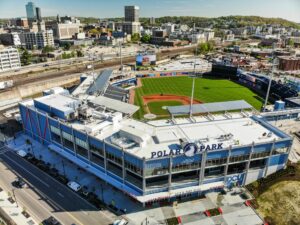For-profit multifamily developers that have shied away from Massachusetts’ Gateway Cities because their rents didn’t support the cost of new construction are betting on Worcester’s economic and population growth to push projects across the finish line.
Two market-rate apartment complexes are seeking approval near the eight-month-old Polar Park minor league baseball stadium, bringing nearly 600 new housing units to the downtown area.
“Worcester’s population is now well over 200,000 and people continue to be attracted to the diversity it has in employment,” said Rich Mazzocchi, managing director of Boston Capital Development. “The ballpark has had a very positive impact.”
Civico, a developer that’s previously built only affordable housing in Worcester, is preparing to seek approval for a new market-rate project as part of a larger mixed-income neighborhood at a manufacturing complex four blocks from the home of the Red Sox’ AAA affiliate.
Worcester’s population grew by 14 percent in the past decade to top 206,000 in the 2020 U.S. census, about twice the statewide average. Since then, developers say widespread adoption of hybrid or remote workplace models in many industries make Worcester more attractive to renters previously tied to working in Greater Boston offices.

Developer V10 Capital is proposing a 173-unit apartment complex behind Worcester’s Polar Park. The $70 million complex was recently redesigned to control escalating construction costs. Image courtesy of The Architectural Team
Table Talk Property Sold to Boston Capital
Boston Capital bought the former Table Talk Pies headquarters at 153 Green St. this month for $4.5 million, a milestone in its multistage redevelopment plans. It’s planning to build up to 400 market-rate and affordable units in a mix of new construction and reuse of a portion of the former bakery, Mazzocchi said.
The first phase, 81 affordable units in a 6-story building occupying a 1-acre portion of the site, is scheduled to break ground in the second half of this year, subject to state approval of low-income tax credits and additional funding from the Massachusetts Department of Housing and Community Development.
Two subsequent phases would incorporate a mix of market-rate and workforce housing, Mazzocchi said. After demolishing 100,000 square feet of the bakery and distribution center, Boston Capital would convert 40,000 square feet at the front of the property into apartments. A third phase would consist of new construction.
Just behind Polar Park’s outfield wall, Boston-based V10 Development is tweaking its plans for a 173-unit apartment complex at 85 Green St. The firm, headed by Ricky Beliveau and John Tocco, bought into the project located on a cluster of parcels originally assembled by Worcester-based developer Gold Block LLC.
Tocco, a Holy Cross College graduate, said he was shocked by the changes to the downtown’s restaurant and nightlife since his college days. The project was originally approved as a 13-story tower using steel construction, but redesigned because of inflationary pressures on material costs.
V10 Development recently submitted redesigns for a 5-story, wood-frame over podium building with the full menu of amenity spaces typical in higher-end projects, plus a roof deck overlooking the Polar Park outfield and 16,000 square feet of retail space. Origin Property Group is V10 Development’s capital partner on the project, now estimated at $70 million.
“It’s a unique place to live and we felt it was a really impactful project for our future residents and will help turn that neighborhood around,” Tocco said.
Following local approvals, the project would seek construction financing in the second half of the year, he said.
And ballpark boosters got another piece of good news last week: Rockland Trust, UniBank and Peoples Bank announced they were providing a $57 million financing package for Madison Properties’ 228-unit SOMA apartment building next door.
Industrial Complex Eyed for Mixed-Income Community
On Lagrange Street approximately a half-mile from the ballpark, developer Civico is expanding its portfolio with the goal of creating a mixed-income community.
The firm recently received approval for adaptive reuse of four manufacturing buildings into 63 apartments, 40 of which would be income-restricted at 60 percent or lower of area median income (AMI) and make Civico eligible for low-income tax credits. The remainder would be designated at workforce housing at 80 percent of AMI. Groundbreaking would follow the potential award of tax credits in 2023, said Taylor Beardon, a partner at Civico.

Steve Adams
Civico now has an additional nearby property under agreement at 98 Beacon St.. The 4-story mill building would include Civico’s first market-rate development in Worcester, with approximately 50 apartments.
“Long-term, we are all bullish on Worcester and this particular neighborhood,” Beardon said, mentioning the proximity to the transforming Main Street retail corridor. “Every income level needs housing and the more diversity of residents in a community, the better.”
Worcester offers another apparent advantage compared with Boston and several of its surrounding communities: no minimum requirement for income-restricted units in new multifamily projects. As a developer of both categories of housing, Beardon said the discussions on an inclusionary development policy in Worcester should begin soon to manage growth.
“From an investment perspective, Worcester is perceived as a very hot and viable market and there are a lot of outside investors seeking yield here,” he said. “We need to have conversations about what tools we as a city have to responsibly manage progress and change. It’s prudent to do that before that happens, rather than when it’s in the rear view.”




 |
| 

